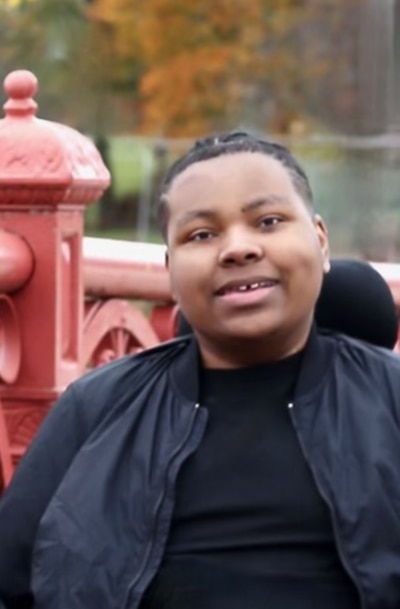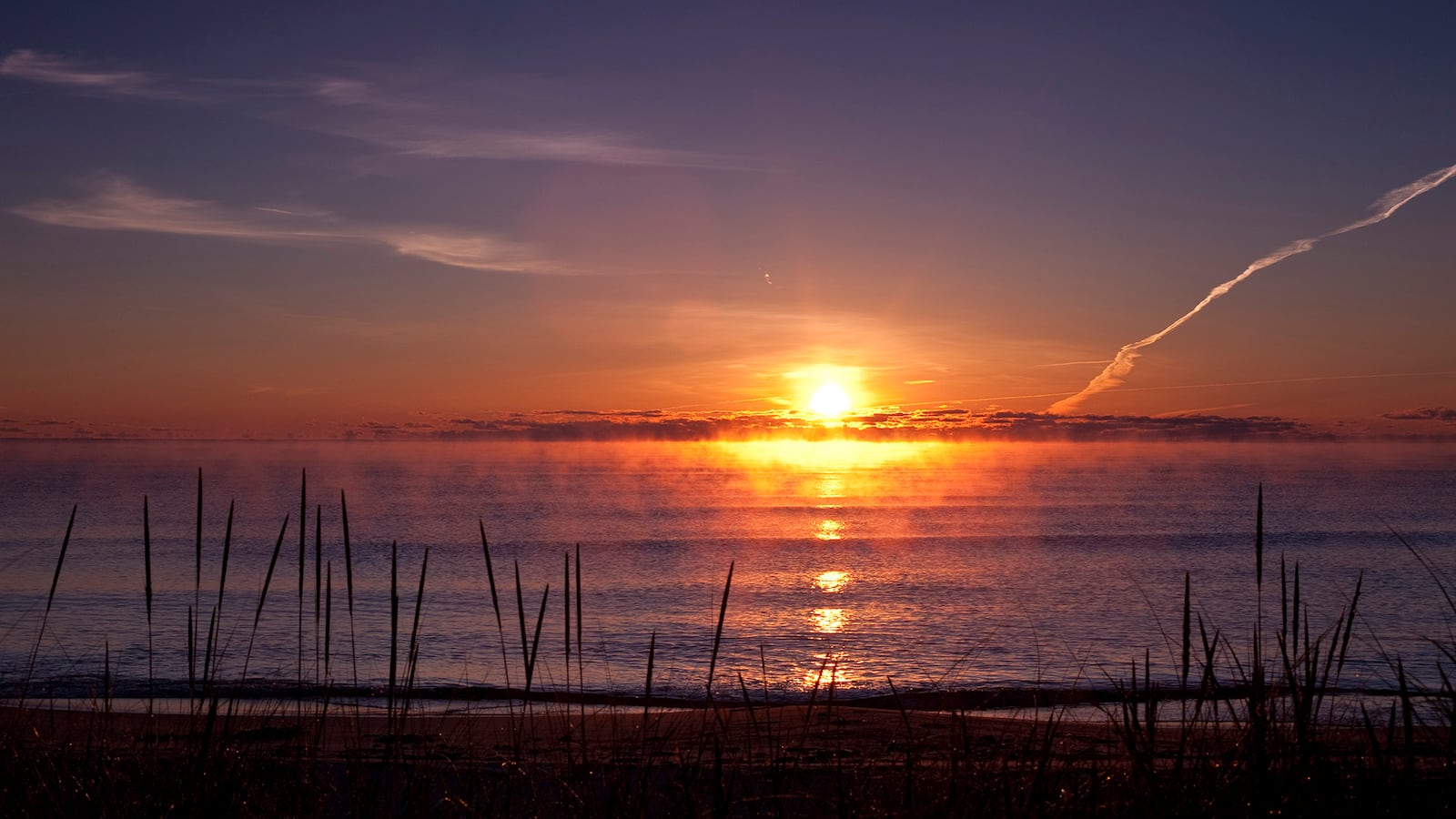As I sit in front of a 50-foot tree covered in rows of glow sticks — with one slot still empty — I think of the friends and loved ones I’ve lost throughout my life. The memories are like raindrops as they become a puddle. From my hand dangles the missing glow stick, uncracked.
I rejoice in thoughts that my lost friends are running around happy and alive in the afterlife; at the same time, my heart aches, because they are no longer by my side. I am soothed by the friends who are still here as we sit, parked side by side. Having them there gives me the strength I need as I crack my glow stick, say my wish, and set it on the Wishing Tree.

We are in the woods near Lake Huron at a campsite that hosts camps for kids and adults with muscular dystrophy, a group of diseases that cause weakness, muscle decay, and impaired sensations.
Despite the limitations these neuromuscular diseases that fall under the muscular dystrophy umbrella can cause, summer camps like this one allow people with these conditions to be more than just their limitations. They allow us to connect with other people with similar conditions.
Before camp, I was extremely extroverted, charismatic, and funny, so making friends wasn’t too hard. But I was often the only wheelchair user in many of the places I went. People would stare, point, and whisper as if I could not hear their words or feel their eyes on my skin as they stared.
This all changed when I was 6 and went to MDA Summer Camp in Lexington, Michigan, for the first time. There, I was surrounded by 100 people just like me. Everywhere I looked, there was a camper with whom I found some similarities — from wheelchairs to crutches to those who could only take a few steps before exhaustion caused them to seek a wheelchair.
During camp, I was placed in a cabin with five other campers, and two of the campers were the same age as I was and shared the same diagnosis: spinal muscular atrophy. The three of us grew close due to our similarities. Each year, we remained cabin mates, and our familial bond strengthened.
We talked about things other people just couldn’t understand. We all looked at the world through a similar lens; we could all look at the sky and see the same blue.
At camp, we are able to do activities that most people without muscular dystrophy can do, like swimming in Lake Huron and going horseback riding. I’m from Detroit, so seeing horses was startling at first. With some mild convincing, I was placed on a horse with someone behind me to manage my balance. My counselor walked alongside the horse, mainly to keep me calm. I rocked back and forth on the horse as it slowly walked step by step.
Extremely passionate and cheerful volunteers plan activities. Each year, they put on skits designed to make us smile. My personal favorite is the joke-filled magic show featuring the magicians Magico and Razzmatazz.
Though the camp is full of joy, it still acknowledges the sadness we feel because we’ve lost loved ones. On the last day of camp, a ceremony at dusk is dedicated to the individuals who have died, and we light a glow stick in their honor on the Wishing Tree. During this time, the community comes together, sheds tears, shares memories, and holds each other close.
The first time I experienced the Wishing Tree, I didn’t fully get it. I knew it was something we were doing to honor our loved ones, and while many people were crying, I didn’t fully understand why. I hugged those who came to me as a reflex, not an intention.
While not all campers are wheelchair users, the shared experiences are just one of many layers that make this camp a family. We have a song written by the longtime camp volunteer Karen MacDonald that perfectly sums up the meaning of camp. The chorus goes like this: “Where some of us roll and some of us walk, yea, we’re all the same in this magical place.”
Summer camps like this one allow people with these conditions to be more than just their limitations.
Ian Zurawski, 17, is a close friend of mine and a camper who uses a wheelchair due to spinal muscular atrophy. “You really just make and find your people, and you make a family — one that you’ll never forget,” he said of the camp community.
The reality of having a neuromuscular condition is not lost on me for reasons beyond my having one. I’ve also lost many friends to these conditions, as several types of muscular dystrophy will eventually lead to death.
Zachary “Diezel Train” Davis was a bright-eyed camper with Duchenne muscular dystrophy. With a soft, raspy voice and a mouth that had no filter, he said how he truly felt and enlightened others while doing so.
Once, while riding together at camp, I kept saying “Excuse me” to people in our way. Diezel said, “Just keep going. They’ll move.” Then he said, “If they don’t move. Just run them over.” This summed up Zachary. He was one of a kind.
Zachary was more than a friend to me — a brother is the only way to put it. Though he is no longer here physically, his words of wisdom stay with me to this day, nearly three years after his passing. While I cannot quote him directly due to his profane tongue, something he said that stuck with me was “not to be scared.” Through any challenge I take on, I remember his words, and I roll forward with my head held high. Zachary loved wrestling, loved the ladies, and, most importantly, loved his family, which I am proud to say I was a part of.
The Wishing Tree ceremony takes place on the last day of camp at dusk. As the sun starts to set and the gray light takes over the sky, everyone at camp grabs a glow stick and surrounds the Wishing Tree.
This is a time for quiet.
This is a time for reflection.
This is a time to pay our respects and remember the deceased.
It is also a time to make a wish for our future.
While we honor those who have died and look ahead with hope, we hold each other tight. As I grew and matured, and as I lost friends to illness, I came to understand what the Wishing Tree experience is all about.
As I made my way to the tree this year, memories crept into my mind. The smiling faces of fallen friends began to fade as new friends and others who had matured and lived came into focus. I tried my best to contain my tears until Patrick, a friend who knew a younger me, spoke about how proud and amazed he was at my personal growth. Tears came again, as another friend a few years younger named Colin told me, “Being there for others is good, but don’t forget to share your burdens with others.”
“Those are some wise words,” I told him, to which he said, “I learned from you.”
Then, the dam holding back my tears broke wide open when someone approached me with open arms. For a while, we sat there, locked in a hug, crying on each other’s shoulders. At this moment, no words were shared; they weren’t needed.
An eternity passed during this hug, and the kid who never stopped talking became a man who chose his words carefully and knew when they weren’t needed.
At the end of our hug, she tells me how one of her friends waits until everyone leaves the Wishing Tree to hang their light. I, too, found myself with my friends at the tree after most people had left. My glow stick remained uncracked.
The last part of the Wishing Tree ceremony focuses on one of the most powerful things in the world: hope. Another key part of the Wishing Tree is to make a wish that is up to each person’s discretion. Hope for the future, a message to a loved one.
Zachary’s brother, Dominic Davis, said it best when talking about his goal: “To raise awareness (about) this disease and what it can’t take from our community: hope.”
Torrance Johnson is a high school senior with a passion for music and writing. His goal is to share his experiences and stories with others through them.
A version of this piece was written with the support of the Detroit Writing Room’s Journalism Camp, in partnership with Coaching Detroit Forward.


